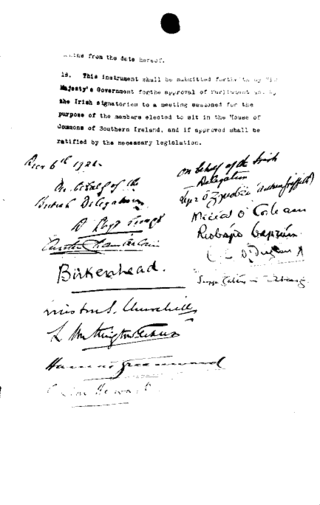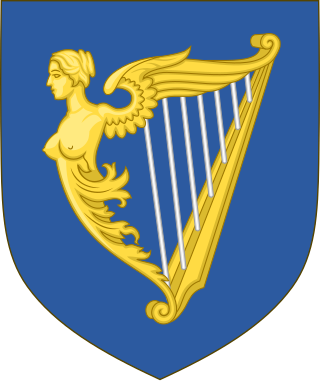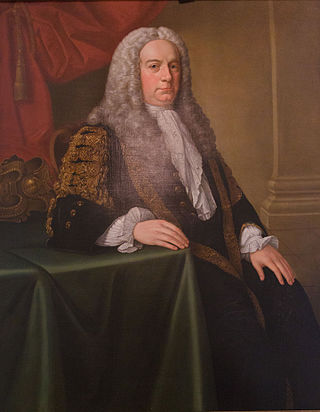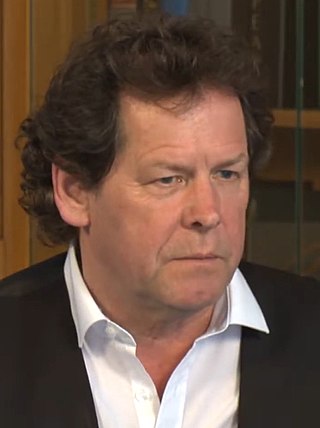Related Research Articles

The Parliament of the United Kingdom is the supreme legislative body of the United Kingdom, the Crown Dependencies and the British Overseas Territories. It meets at the Palace of Westminster, London. It alone possesses legislative supremacy and thereby ultimate power over all other political bodies in the UK and the overseas territories. Parliament is bicameral but has three parts, consisting of the sovereign (King-in-Parliament), the House of Lords, and the House of Commons. In theory, power is officially vested in the King-in-Parliament. However, the Crown normally acts on the advice of the prime minister, and the powers of the House of Lords are limited to only delaying legislation; thus power is de facto vested in the House of Commons.

Anne was Queen of England, Scotland and Ireland from 8 March 1702 until 1 May 1707. On 1 May 1707, under the Acts of Union, the kingdoms of England and Scotland united as a single sovereign state known as Great Britain. Anne continued to reign as Queen of Great Britain and Ireland until her death in 1714.

The 1921 Anglo-Irish Treaty, commonly known in Ireland as The Treaty and officially the Articles of Agreement for a Treaty Between Great Britain and Ireland, was an agreement between the government of the United Kingdom of Great Britain and Ireland and representatives of the Irish Republic that concluded the Irish War of Independence. It provided for the establishment of the Irish Free State within a year as a self-governing dominion within the "community of nations known as the British Empire", a status "the same as that of the Dominion of Canada". It also provided Northern Ireland, which had been created by the Government of Ireland Act 1920, an option to opt out of the Irish Free State, which the Parliament of Northern Ireland exercised.

The Acts of Union 1800 were parallel acts of the Parliament of Great Britain and the Parliament of Ireland which united the Kingdom of Great Britain and the Kingdom of Ireland to create the United Kingdom of Great Britain and Ireland. The acts came into force on 1 January 1801, and the merged Parliament of the United Kingdom had its first meeting on 22 January 1801.

Poynings' Law or the Statute of Drogheda was a 1494 Act of the Parliament of Ireland which provided that the parliament could not meet until its proposed legislation had been approved both by Ireland's Lord Deputy and Privy Council and by England's monarch and Privy Council. It was a major grievance in 18th-century Ireland, was amended by the Constitution of 1782, rendered moot by the Acts of Union 1800, and repealed by the Statute Law Revision (Ireland) Act 1878.

The Parliament of Ireland was the legislature of the Lordship of Ireland, and later the Kingdom of Ireland, from 1297 until 1800. It was modelled on the Parliament of England and from 1537 comprised two chambers: the House of Commons and the House of Lords. The Lords were members of the Irish peerage and bishops. The Commons was directly elected, albeit on a very restricted franchise. Parliaments met at various places in Leinster and Munster, but latterly always in Dublin: in Christ Church Cathedral, Dublin Castle, Chichester House (1661–1727), the Blue Coat School (1729–31), and finally a purpose-built Parliament House on College Green.
John Curtis may refer to:
The Curtis Cup is the best known team trophy for women amateur golfers, awarded in the biennial Curtis Cup Match. It is co-organised by the United States Golf Association and The R&A and is contested by teams representing the United States and "Great Britain and Ireland". The same two teams originally contested the Ryder Cup, but unlike that competition, the Curtis Cup has not widened the Great Britain and Ireland team to include all Europeans. Many women who have gone on to become stars of women's professional golf have played in the Curtis Cup.

The United Kingdom uses Greenwich Mean Time or Western European Time (UTC) and British Summer Time or Western European Summer Time (UTC+01:00).

The R&A is the collective name of a group of companies that together play a significant role within the game of golf. Historically, "the R&A" was a colloquial name for the Royal and Ancient Golf Club of St Andrews; in 2004, the club spun off its previous governance and tournament organisation roles into the current R&A group, with the club itself reverting to a private members-only club. The R&A is based in St Andrews in Scotland. The R&A is the sole owner of three subsidiary companies: R&A Rules Limited, R&A Championships Limited, and R&A Group Services Limited.

Henry Boyle, 1st Earl of Shannon, PC, was an Anglo-Irish politician and peer who served as the speaker of the Irish House of Commons from 1733 to 1756. A prominent parliamentarian who sat for almost fifty years in the Parliament of Ireland, Boyle frequently defended Irish interests against British officials, eventually leading to a legal crisis which saw him step down as speaker in return for a peerage.
The United pastoral districts of Moreton, Wide Bay, Burnett and Maranoa, and from 1857 Moreton, Wide Bay, Burnett, Maranoa, Leichhardt and Port Curtis, was an electoral district of the Legislative Assembly in the Australian state of New South Wales created in 1856 and consisted of the pastoral districts around the early settlements of Moreton Bay; Wide Bay, near Maryborough; the Burnett River, near Bundaberg; and the Maranoa region of South-western Queensland. In September 1856 the pastoral districts around the Leichhardt River in the Gulf of Carpentaria region and Port Curtis (Gladstone) were added to the electorate. The district was abolished for the 1859 election and replaced by the separate districts of East Moreton, West Moreton, Burnett and Leichhardt, while Maranoa became part of Darling Downs. All of these districts became part of Queensland when it was established as a separate colony in late 1859.
Leichhardt was an electoral district, located in the colony of New South Wales, Australia, and part of the New South Wales Legislative Assembly. The district was created for the July 1859 election, partly replacing the United Pastoral Districts of Moreton, Wide Bay, Burnett, Maranoa, Leichhardt and Port Curtis in the present day central Queensland. It included the towns of Rockhampton and Emerald, the pastoral districts around the Leichhardt River in the Gulf of Carpentaria region and Port Curtis (Gladstone). It was abolished in December 1859 as a result of the separation of Queensland.
Charles Curtis Craig was an Irish Unionist and later Ulster Unionist politician. He was Member of Parliament (MP) for constituencies in County Antrim from 1903 to 1929, taking his seat in the House of Commons of the United Kingdom. The son of James Craig, of Craigavon, Belfast, a self-made millionaire whisky distiller, among his brothers was Northern Ireland's first Prime Minister, James Craig.
Frank Adams was a rugby union international who represented England from 1875 to 1879. He also captained his country.

Ireland uses Irish Standard Time in the summer months and Greenwich Mean Time in the winter period..

Tony Curtis is an Irish poet.
Ronan Curtis is an Irish professional footballer who plays as a left-winger for League One side Portsmouth and the Republic of Ireland.
References
- ↑ E. M. Johnston-Liik, MPs in Dublin: Companion to History of the Irish Parliament, 1692-1800 (Ulster Historical Foundation, 2006), p.82 (Retrieved 2 April 2020).